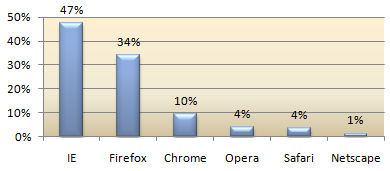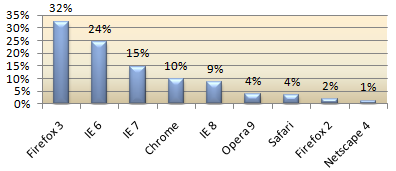Perhaps they need to market their browser first...
Here’s an interesting data point when you consider the challenge that Google has ahead of them for broad US adoption of their (at the moment vaporware) upcoming Chrome OS.
We keep piles of statistics of traffic over at www.GibraltarSoftware.com. After all, as the site for our flagship product it’s really important for us to understand who’s visiting the site, how they get there, where they go, and if we are meeting our goals. While getting ready for the next release of Gibraltar we published some site updates today and wanted to know how much time to put into browser compatibility. So, we poured through the data from the last six months on the site and found a few surprises.
To get some context, consider who are likely candidates to visit the site:
- For the last six weeks we’ve advertised at Stack Overflow.
- We’ve also posted a Press Release at PRWeb, and are listed in the Visual Studio gallery at MSDN.
- We participate in the Business of Software forum and a few Microsoft .NET-specific forums.
If you exclude the press release, everything else is in places where readers are .NET oriented: Either looking for answers to .NET problems on Stack Overflow, on MSDN looking at the Visual Studio gallery, or on a .NET specific forum. Business of Software could go either way, but we’re known for being .NET oriented on that forum.
Likewise, our product isn’t something every developer is going out and looking for: it’s not a defect tracker or a profiler or a source code control system. We’re targeting folks that are trying to take their applications to the next level and recognize the value of putting a little time in now to save time at the right moment later.
From this, we’d assume that the typical visitor is:
- Involved on a daily basis with Microsoft .NET.
- Technically progressive.
- Substantial user of the Internet
From this, what would you think the distribution of browsers would be for our site?
Show me the Data
We pulled the data from our site for the last 6 weeks which excludes any traffic generated by any employee or contractor for eSymmetrix or Gibraltar Software. We’ve excluded all spiders and things that had usage patterns that looked like crawlers of any kind. Here’s the result:

Percentage of visits by browser family for six week period
Some of the stats her make a lot of sense: You’d bet given our heavy Microsoft .NET orientation for the site that IE would be the number one browser. Likewise, since there’s no way to run our product on a Mac you’d expect very low Safari use.
What really surprised us is the poor showing of Chrome. It barely beat out the combination of Opera, Safari, and Netscape: browsers that you wouldn’t expect to see much of on our site.
When we look at the specific versions at play there’s more:

Percentage of Visits by Browser Version
Now there seems to be something for the Mozilla foundation to cheer about here: Even in an MS-centric crowd Firefox came out on top. But wait… It’s very interesting that there’s really just one version of Firefox in play, the latest. This seems most likely because of the lengths that Firefox goes to make you update to the latest version. It’s a good example both of the power of defaults and the power of not being Microsoft: You can by default make users do things that are in your best interest.
Chrome dispenses with version declaration all together, and why shouldn’t they: They don’t even tell you that they’re updating and patching your software as you go. Again, the power of not being Microsoft.
Now, did you notice the really sad thing? The piece that has us really depressed? There it is - IE 6. Frankly, we don’t want to support it. The lack of PNG transparency support, poor image resizing and CSS oddities really ups our workload whenever we update our site. Now, I’m not bashing IE 6: Remember it shipped in 2001. Do you know how Good Firefox was in 2001? Yeah, not good. But Microsoft is Microsoft so they can’t make you update something, and here in this crowd of progressive technical folks IE 6 is our second most popular browser, equal to the share of IE 7 and 8 put together.
All Dressed Up…
We love Chrome. It’s our default browser, and I think it makes Firefox look positively old school in comparison. If we go back in time, we can see that the Chrome percentage came from the Firefox camp, not the IE camp. But, if Google can’t get technically sophisticated, current folks to give their browser a spin then how are they going to fare trying to convince my parents that they should use an OS that can’t run Microsoft Office?
Frankly, I’d rather see Google finally convince folks to ditch IE 6 and use something modern instead of blowing time trying to create their own fork of Linux. Alternately, Microsoft IE 8 will do just fine: It’s not my choice, but we’ve yet to have to make a change to our site to make that browser work which isn’t something we can say for any of the others. There’s just no excuse for having IE 6 on your machine any more, even a server. Every time you run Windows Update, it’s begging you to install a modern browser. Let it. Really, it’s much better.